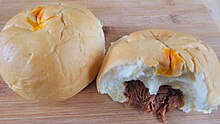Philippine asado
 Pork asado from Pampanga | |
| Course | Main course |
|---|---|
| Place of origin | Philippines |
| Associated cuisine | Filipino cuisine |
| Serving temperature | Hot |
| Variations | Asado de carajay; Asado matua; pork asado |
| Similar dishes | Humba, pata tim, adobo, hamonado |
Philippine asado refers to two different Filipino braised meat dishes. The name originates from Spanish asado ("grilled"), a reference to the original dish it was applied to, the Chinese-Filipino version of char siu barbecues usually known as pork asado. However, the Filipino versions have evolved to be braised, not grilled. The other Filipino dishes also known as asado are asado de carajay and asado matua. Unlike the Chinese-derived version, they are savory rather than sweet.[1][2]
Variations
[edit]Asado de carajay
[edit]
Asado de carajay is a native asado. The name is derived from Philippine Spanish carajay ("wok", kawali or kalaha in Philippine languages). Asado de carajay is made with meat (pork, beef, or chicken) braised in soy sauce, bay leaves, peppercorns, calamansi, onions, and various vegetables (usually tomatoes, potatoes, mushrooms, and carrots). It is traditionally cooked in a wok, hence the name.[2][3][4]
Asado de carajay is differentiated from the "Chinese-style" pork asado in the use of vegetables, the absence of Chinese spices, and its savory flavor. It is also not restricted to pork, but can be cooked with beef or chicken.[5][6][7][8]
Asado matua
[edit]
Asado matua (Kapampangan for "old-fashioned/traditional asado") is a unique variation of asado de carajay that originates from Pampanga. It uses whole pork rump or shoulder (known as kasim) slow-cooked in a sauce with tomatoes, potatoes, calamansi, oregano, garlic, onion, black pepper, soy sauce, salt, and oil. Variations in different household recipes also add other ingredients like grated cheese, chorizo de Bilbao, chicken liver, pickles, and/or Vienna sausages.[9][10][11]
Asado matua is also known as "Kapampangan asado", asadong pasko, asadong barrio, and abo-abo, among other names, due to their association with rural festivities in the province of Pampanga.[9]
Pork asado
[edit]
Pork asado, also known as "Chinese" asado or "Chinese-style" asado, is the variant most commonly associated with the name asado. It is derived from the Chinese dish char siu, and possibly also influenced by the Hokkien dish tau yew bak. Unlike char siu, however, the dish is always braised, not grilled or roasted. The dish is made with pork braised in soy sauce, garlic, bay leaves, onion, brown sugar, and various Chinese spices (usually star anise and five spice). It is very similar to humba and pata tim, which also originate from Chinese-Filipino migrants. It also resembles hamonado, because of its sweetness, though hamonado uses pineapples and is a native dish.[12][13][14][15][16][17]
Pork asado is usually sliced thinly and served with the braising liquid.[13] Pork asado is also commonly shredded and used as fillings for sandwiches and buns. It is also the primary filling of the Filipino siopao, which is also known as siopao asado.[18]
A variant of pork asado is the "Macau-style" pork asado. It uses the same ingredients but differs primarily in that the meat isn't broiled beforehand, but rather it is boiled directly in the marinade until tender.[15][19][20][21]
See also
[edit]- Humba
- Pata tim
- Chicken karahi - An Indian meat and vegetable curry named after and braised in a wok (karahi in Indian languages). A possible origin for this dish
- Cuisine of the Philippines
- List of Philippine dishes
References
[edit]- ^ "Pork Asado". Ang Sarap. Retrieved March 29, 2019.
- ^ a b Alvarez, Lhas. "Kapampangan Chicken Asado Recipe". Yummy.ph. Retrieved March 29, 2019.
- ^ "Filipino Asado Pork Recipe: Pork Stewed with Tomatoes, Soy Sauce and Lime Juice". Filipino-food-recipes.com. Retrieved March 29, 2019.
- ^ "Chicken Asado". the heart of food. Retrieved March 29, 2019.
- ^ "Lola Virginia's Asadong Manok de Carajay". Yummy.ph. Retrieved March 29, 2019.
- ^ "Beef Asado de Carajay". Panlasang Pinoy Meaty Recipes. Retrieved March 29, 2019.
- ^ "Asado de Carajay". straight forward recipes. Retrieved March 29, 2019.
- ^ "How to Cook Asado de Carajay : Pork Stew in Tomatoes and Vegetables". Asian in America. Retrieved March 29, 2019.
- ^ a b "Asadong Matua". Ang Sarap. Retrieved January 14, 2024.
- ^ "Pork Asado Kapampangan". Foxy Folksy. Retrieved January 14, 2024.
- ^ Jorolan, Poch. "Asadong Matua (Old-Fashioned Pork Asado) Recipe". Yummy.ph. Retrieved January 14, 2024.
- ^ Boi, Lee Geok (2014). Asian Soups, Stews and Curries. Marshall Cavendish International Asia Pte Ltd. ISBN 9789814634687.
- ^ a b Veneracion, Connie. "Pork asado". Casa Veneracion. Retrieved March 29, 2019.
- ^ Angeles, Mira. "Chinese-Style Pork Asado Recipe". Yummy.ph. Retrieved March 29, 2019.
- ^ a b Marquis, Margarita. La Cuisine des Philippines. Editions Publibook. p. 17. ISBN 9782748386448.
- ^ "Filipino Pork Asado". Serve With Rice. Retrieved March 29, 2019.
- ^ De Leon, Adrian (2016). "Siopao and Power: The Place of Pork Buns in Manila's Chinese History". Gastronomica. 16 (2): 45–54.
- ^ "Siopao Asado". Kawaling Pinoy. Retrieved March 29, 2019.
- ^ "Macau Style Pork Asado". Panlasang Pinoy Meaty Recipes. Retrieved March 29, 2019.
- ^ "Pork Spareribs Macao-style Asado". Kawaling Pinoy. Retrieved March 29, 2019.
- ^ "Pork Asado (Macao Style)". Philippine Cuisine List of recipes from Filipino Cuisine. Retrieved March 29, 2019.
External links
[edit] Media related to Philippine asado at Wikimedia Commons
Media related to Philippine asado at Wikimedia Commons

